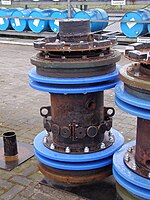
Photo from wikipedia
Abstract A reliability model for underground pipeline management that can quantify the trade-off between risk reduction and increased maintenance costs in various underground piping management scenarios can be useful for… Click to show full abstract
Abstract A reliability model for underground pipeline management that can quantify the trade-off between risk reduction and increased maintenance costs in various underground piping management scenarios can be useful for many pipeline-maintenance decision-makers. In this paper, we propose a comprehensive framework for analyzing underground pipeline management options. Pipeline reliability is calculated using time-dependent and independent limit state functions with a probabilistic model and a deterministic model about the frequency of a failure occurrence event. The proposed framework includes the target reliability, consequences, and cost model, and has the advantage that it can be intuitively utilized for piping management decision-making. We conducted several case studies using a Monte Carlo simulation on pipelines in industrial complexes in Korea.
Journal Title: Journal of Loss Prevention in The Process Industries
Year Published: 2020
Link to full text (if available)
Share on Social Media: Sign Up to like & get
recommendations!